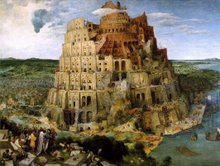 A recent article in the Reader Supported News reveals something that is not news to me: that the kind of historical manipulation routinely practiced by Glenn Beck is spreading to actual politicians in the conservative party. (Seriously guys, I respect conservative ideology, but this guy is making all of you look like morons. Please find a conservative intellectual to support!) Now, certainly, the left has had its fair share of people trying to rewrite the facts in order to support their arguments. But the conservatives are taking it to a completely different level. There's a difference between Historians debating the meaning and sometimes facts of history, and a politician attempting to eliminate inconvenient events or flat out changing them. Ever read Orwell's 1984? Isn't that what Big Brother did? This is something we should be wary of, especially today, with the pervasiveness of the Internet, everyone can blur the lines between fact and fiction. And perhaps this is why we have so many misinformed people out there. Journalism and fact checking is on the decline and the gluttony of information to sift through is increasing.
A recent article in the Reader Supported News reveals something that is not news to me: that the kind of historical manipulation routinely practiced by Glenn Beck is spreading to actual politicians in the conservative party. (Seriously guys, I respect conservative ideology, but this guy is making all of you look like morons. Please find a conservative intellectual to support!) Now, certainly, the left has had its fair share of people trying to rewrite the facts in order to support their arguments. But the conservatives are taking it to a completely different level. There's a difference between Historians debating the meaning and sometimes facts of history, and a politician attempting to eliminate inconvenient events or flat out changing them. Ever read Orwell's 1984? Isn't that what Big Brother did? This is something we should be wary of, especially today, with the pervasiveness of the Internet, everyone can blur the lines between fact and fiction. And perhaps this is why we have so many misinformed people out there. Journalism and fact checking is on the decline and the gluttony of information to sift through is increasing.However, this tradition is not just limited to politics. Art historians have been practicing this for hundreds of years and have put forth a tremendous effort in the 20th century to do just that. Take for example the linear concept that all of Art History is merely an evolution culminating in "Jack the Dripper"... Something drilled into your head in every American University. And by a funny coincidence, post-modernism is now the conservative stance within the Art world (don't believe me? Think of Damien Hirst, Jeff Koons, Takashi Murakami) - another reason we must balance the Art Oligarchy with a rational system of evaluation based on universal and more objectively measurable criteria: beauty, skill, humanism (communication and emotion). Which makes us figurative artists not conservative, but revolutionary. Perhaps the political establishment would benefit from the rational revolution as well?


2 comments:
Absolutely, "we must replace the Art Oligarchy with a rational system of evaluation based on universal and more objectively measurable criteria: beauty, skill, humanism (communication and emotion). Which makes us figurative artists not conservative, but revolutionary."
I believe this can be done, but there is more that is necessary for the criteria, that will make it ...rational; indeed, inarguable, to any thinking person. Just those words/ideas, leaves a large crack in things. "Revolution" itself, leads us in a dangerous direction where history could repeat itself creating another "knowledge gap" for future realist artists. Think of..The Marshall Plan...for starters.
Thanks for the feedback. I'm interested in hearing your additional criteria.
Also, I'm interested in exploring the usefullness of the term "Revolution". How would it create a knowledge gap?
Post a Comment